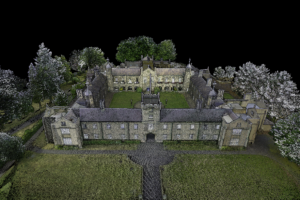Energy-saving at the forefront of University Building courses

The University of Wales Trinity Saint David (UWTSD) has secured funding from Swansea Bay City Deal’s Skills and Talent Programme to deliver courses in energy-saving building techniques to combat the climate crisis.
UWTSD’s Construction Wales Innovation Centre’s (CWIC) new project, Construct Net Zero Cymru – Not Business as Usual, will provide courses, delivered by industry experts with a combination of practical and theoretical work education at various levels, about a type of design called Fabric First.
A ‘fabric first’ approach to building design, as defined by www.designingbuildings.co.uk, ‘involves maximising the performance of the components and materials that make up the building fabric itself, before considering the use of mechanical or electrical building services systems.’
The technique utilises methods such as maximising airtightness, increasing insulation, optimising solar gain and natural ventilation to minimise the need for energy consumption and reduce carbon emissions.
Construct Net-Zero Cymru activities will work alongside partners in industry, Higher and Further Education, schools and the third sector to create and deliver micro courses in Fabric First Design with the use of the University’s facilities and equipment to enhance skill levels.
Courses will be delivered to beneficiaries through unique hands-on workshops at CWIC by industry experts. The new courses will consist of a mixture of 8 programmes about Fabric First in New Build and Retrofitting. These are:
Fabric First in New Build:
Building envelope design
MMC
Passive solar design
Building physics and performance
Mechanical/Renewable heat and ventilation
Fabric First Retrofitting:
Building Assessments-including a range of performance assessments, energy modelling, and identification of energy saving opportunities
Building Assessments- insulation, air tightness, doors, windows and thermal mass to reduce the building’s reliance on energy for heating and cooling
Smart building technology.
UWTSD aims to provide these half-day or day-long courses to 150 individuals from industry, 20 Educators, 50 unemployed/other and 200 students from level 2-7. Each of the courses will be tailored to suit the different audiences.
Rachel Cook, Industry Support Officer for Net Zero at UWTSD’s Construction Wales Innovation Centre says: “We cannot hide from the immediate climate emergency we are in or look away from the impacts the construction industry can have. With energy prices soaring we need to ensure our existing and new housing stock is as energy efficient as possible.
“The Fabric First approach embodies a ‘get it right first-time’ attitude, and considers the importance of building materials, installation, and the impacts these things have on the energy performance of buildings. It’s a very exciting, hands-on project that industry is glad to be engaged in and part of.”
The content of the course will be created by industry experts and educators as well as utilising existing resources.
The University is hoping to recruit the first students from November 2023, with the scheme running until January 2025.
Jane Lewis, Regional Partnerships Manager for Swansea Bay City Deal said: “Sustainability and new technology are now at the heart of how we design, build, and live in new Welsh homes. These ways of working and using materials are very different to traditional methods but are key to achieving a circular Welsh economy.
“Embracing change requires new skills and knowledge, which the Construct Net Zero Cymru programme and the training from CWIC will provide through practical learning and by growing awareness of new construction and design methods. This is a really exciting opportunity to ensure the skills of the future are there to meet the many opportunities that will be available in the region over the next 10 years.”
For more information visit the website at https://cwic.wales/construct-net-zero-cymru/




